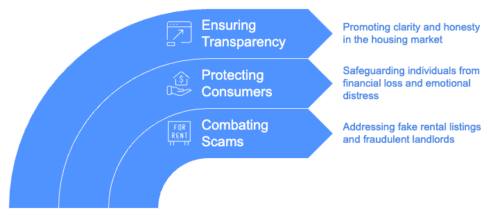
Safe Rental Application Sites to Trust When Searching for Your Next Home
June 21, 2023
The Role of Technology in Facilitating and Preventing Housing Scams
August 16, 2023Housing fraud is an ongoing concern that affects countless individuals searching for affordable homes. From fake rental listings to fraudulent landlords, scams in the housing market can result in financial loss and emotional distress. Government agencies play a critical role in combating these scams, protecting consumers, and ensuring transparency in the housing market.

Key Government Agencies Involved
Several U.S. government agencies are at the forefront of identifying, investigating, and preventing housing fraud. Here are the primary ones involved:
- U.S. Department of Housing and Urban Development (HUD):
- Role: HUD oversees public housing and rental assistance programs. It provides resources to educate consumers about rental rights and fair practices.
- Actions: HUD collaborates with state and local housing authorities to investigate reports of fraud and takes legal action against fraudulent activities in the housing sector.
- Resources: HUD’s official website offers guides on recognizing scams and links to reporting tools for those who have encountered fraud.
- Federal Trade Commission (FTC):
- Role: The FTC works to protect consumers from deceptive practices, including housing scams.
- Actions: The commission investigates claims of rental scams and takes action against perpetrators through legal enforcement. It also educates the public through its consumer alerts and educational materials.
- Reporting: Victims of housing scams can report incidents directly to the FTC, which contributes to national databases used to track and combat fraud.
- Consumer Financial Protection Bureau (CFPB):
- Role: The CFPB focuses on protecting consumers in financial transactions, including those related to housing.
- Actions: The bureau provides guidance on mortgage and rental agreements and handles consumer complaints involving unfair or fraudulent practices.
- Educational Support: The CFPB website features articles and resources to help individuals identify fraudulent housing offers and navigate legitimate housing applications.
- Better Business Bureau (BBB):
- Role: Although not a government agency, the BBB works closely with public entities to track scam activity and promote trustworthy business practices.
- Scam Tracker: The BBB Scam Tracker is a useful tool for renters to check for reported scams in their area and report fraudulent behavior.
- Section 8 Shield: Although not government-run, this platform that you’re using right now provides guidance, tools, and resources to verify housing websites, report scams, and stay informed about common rental frauds. Section 8 Shield helps renters navigate the housing market with a focus on transparency and user safety.
How These Agencies Help Prevent Housing Fraud
Government agencies use a combination of enforcement, public education, and collaboration to fight housing fraud:
| Enforcement and Legal Action: | Agencies like HUD and the FTC have the authority to pursue legal action against fraudulent landlords and rental companies. This includes issuing fines, freezing assets, and collaborating with law enforcement to press charges against repeat offenders. |
| Public Education Campaigns: | Education is key to preventing housing scams. Agencies run awareness campaigns to inform consumers about common scam tactics, such as fake listings, phishing schemes, and impersonation of legitimate property managers. Resources are often provided in multiple languages to reach diverse communities. |
| Collaboration with Other Organizations: | Government agencies often partner with state and local housing authorities, law enforcement, and non-profit organizations to share information and resources. Collaboration helps identify emerging fraud trends and respond effectively to protect consumers. |
| Reporting and Tracking Systems: | Platforms like the FTC Consumer Sentinel Network collect reports from various sources, including state and federal agencies, to monitor and track fraud cases nationwide. This information is used to build stronger cases and prevent scams from recurring. |
How Renters Can Utilize Government Resources
Understanding how to leverage government resources can help renters stay protected. Here’s how to make the most of these tools:
- Check Listings with HUD: Use HUD’s website to access lists of approved public housing and verify the legitimacy of rental assistance programs.
- Report to the FTC: If you come across suspicious activity, report it to the FTC to contribute to their database and help in broader fraud prevention efforts.
- File Complaints with the CFPB: If you experience unfair practices related to rental agreements or housing finance, submitting a complaint to the CFPB can trigger investigations.
- Use the BBB Scam Tracker: Before committing to a rental agreement, check the BBB’s Scam Tracker for reports of scams involving landlords or property management companies.
Success Stories and Impact
Government interventions have led to successful takedowns of major scams and fraudulent operations. For instance, coordinated efforts between HUD and the FTC have exposed schemes involving fake Section 8 landlords, leading to arrests and the dismantling of fraudulent networks. Public reporting played a vital role in these outcomes, emphasizing the importance of community participation.
Steps You Can Take
Renters can take proactive measures alongside government resources to protect themselves:
- Verify Before Paying: Always check a landlord’s credentials and property ownership through public records.
- Use Trusted Platforms: Stick to known and reputable rental platforms when searching for a home.
- Educate Yourself: Take advantage of educational materials provided by HUD, the FTC, and the CFPB to stay aware of common fraud tactics.
Conclusion
Government agencies are vital in the fight against housing fraud, providing not only enforcement but also crucial education and resources for consumers. Renters can enhance their safety by understanding these agencies’ roles, using their resources, and reporting scams to help build a safer housing market for everyone. Platforms like Section 8 Shield further aid in this effort by offering dedicated tools and guidance to protect renters from fraud.




